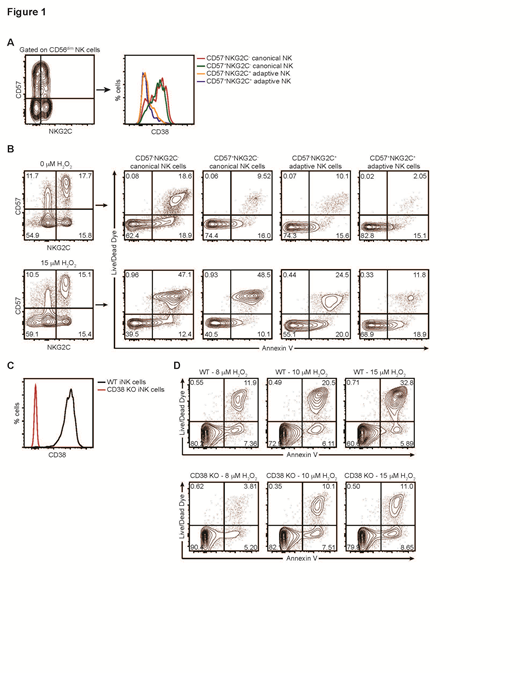Cytolytic effector lymphocytes must contend with unfavorable microenvironments when infiltrating sites of infection or malignancy. Tumor cells typically have high levels of oxidative stress and produce reactive oxygen species (ROS) that suppress the cytotoxic functions of both natural killer (NK) cells and CD8+ T cells. Levels of activated granulocytes that release ROS are also elevated in cancer patients. Free radicals, such as ROS, cause detrimental cellular effects including protein oxidation, lipid peroxidation and DNA damage. Chronic viral infections, including CMV, are also associated with increased oxidative stress. We hypothesized that adaptive NK cells, which arise specifically in response to CMV, could have properties that allow these cells to persist and retain function in high oxidative stress environments.
Adaptive NK cells are present in the peripheral blood of many otherwise healthy CMV seropositive individuals and expand in response to CMV reactivation in hematopoietic cell transplant (HCT) patients. Mounting evidence suggests that CMV peptides presented by HLA-E on infected cells can trigger the expansion of adaptive NK cells expressing the activating receptor NKG2C. The majority of NKG2C-positive adaptive NK cells co-express the terminal maturation marker CD57. Work by our group and others has shown that adaptive NK cells exhibit enhanced antibody-dependent cellular cytotoxicity (ADCC) and interferon (IFN)-γ production relative to canonical NK cells, appear to persist long-term and have metabolic attributes similar to memory CD8+ T cells. We also reported clinical correlations between adaptive NK cell numbers and reduced relapse risk in HCT patients with hematologic malignancies.
Here, we show that CD38 expression is markedly reduced on adaptive NK cells from CMV seropositive individuals. This observation was first made from analyses of RNA-seq data comparing adaptive and canonical NK cells and was validated by flow cytometry (Figure 1A). CD38 is expressed both intracellularly and on the plasma membrane and functions as an NADase, degrading nicotinamide adenine dinucleotide (NAD+) into ADP-ribose and nicotinamide. NAD+ is a necessary cofactor for the sirturin family of protein deacetylases, which protect against oxidative stress. We hypothesized that CD38 downregulation in adaptive NK cells could be associated with more resistance to oxidative stress-induced cell death through increased NAD+ levels and sirturin activity. To determine whether there was a connection between CD38 expression and resistance to oxidative stress, we isolated NK cells from the peripheral blood of CMV seropositive donors and cultured them overnight with or without 15 mM H2O2 (hydrogen peroxide), known to induce oxidative stress and cell death. We found that NKG2C+ adaptive NK cells were markedly more resistant to oxidative stress-induced cell death compared to NKG2C-negative canonical NK cells as determined by annexin V and a fixable amine-reactive dye (LIVE/DEAD) that can permeate damaged membranes of dead cells and react with interior amines (Figure 1B). Similar results were observed in assays where NK cells from CMV seropositive donors were co-cultured with neutrophils pre-activated with phorbol 12-myristate 13-acetate (PMA) to induce the release of reactive oxygen species.
To determine whether CD38 expression is directly associated with the NK cell response to oxidative stress, we generated induced pluripotent stem cell (iPSC) lacking CD38 through CRISPR/Cas9 gene editing that were differentiated into NK cells and tested for their ability to resist oxidative stress-induced death. Compared to control iPSC-derived NK (iNK) cells that express high levels of CD38 (Figure 1C), a substantially larger percentage of CD38 knockout iNK cells were viable when cultured overnight with H2O2 (Figure 1D). Our results have implications for adoptive immunotherapy to treat patients with cancer where a major goal is to manufacture cytotoxic cells that can persist and function in a tumor environment that contains high levels of oxidative radicals. We are exploring other cell stressors of high translational relevance such as freeze/thaw stress in adaptive and CD38 knockout cells that will be critical for cell therapy platforms.
Cichocki:Fate Therapeutics, Inc: Research Funding. Blazar:Kamon Pharmaceuticals, Inc: Membership on an entity's Board of Directors or advisory committees; Five Prime Therapeutics Inc: Co-Founder, Membership on an entity's Board of Directors or advisory committees; Regeneron Pharmaceuticals: Membership on an entity's Board of Directors or advisory committees; Magenta Therapeutics and BlueRock Therapeuetics: Membership on an entity's Board of Directors or advisory committees; Fate Therapeutics, Inc.: Research Funding; RXi Pharmaceuticals: Research Funding; Alpine Immune Sciences, Inc.: Research Funding; Abbvie Inc: Research Funding; Leukemia and Lymphoma Society: Research Funding; Childrens' Cancer Research Fund: Research Funding; KidsFirst Fund: Research Funding; Tmunity: Other: Co-Founder; BlueRock Therapeutics: Membership on an entity's Board of Directors or advisory committees. Bjordahl:Fate Therapeutics, Inc.: Employment. Valamehr:Fate Therapeutics, Inc: Employment. Miller:Fate Therapeutics, Inc: Consultancy, Research Funding; CytoSen: Membership on an entity's Board of Directors or advisory committees; OnKImmune: Membership on an entity's Board of Directors or advisory committees; Dr. Reddys Laboratory: Membership on an entity's Board of Directors or advisory committees; Moderna: Membership on an entity's Board of Directors or advisory committees; GT BioPharma: Consultancy, Membership on an entity's Board of Directors or advisory committees, Research Funding.
NK cells
Author notes
Asterisk with author names denotes non-ASH members.


This feature is available to Subscribers Only
Sign In or Create an Account Close Modal